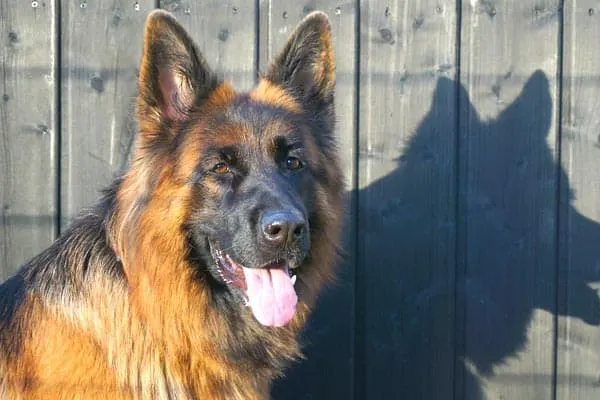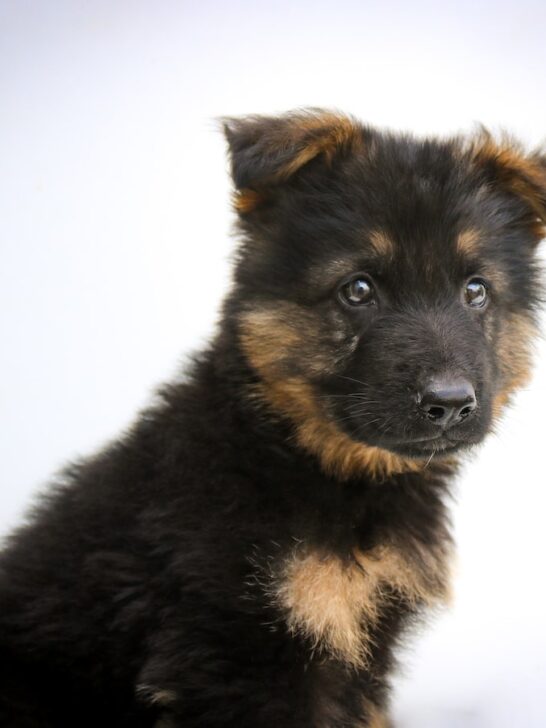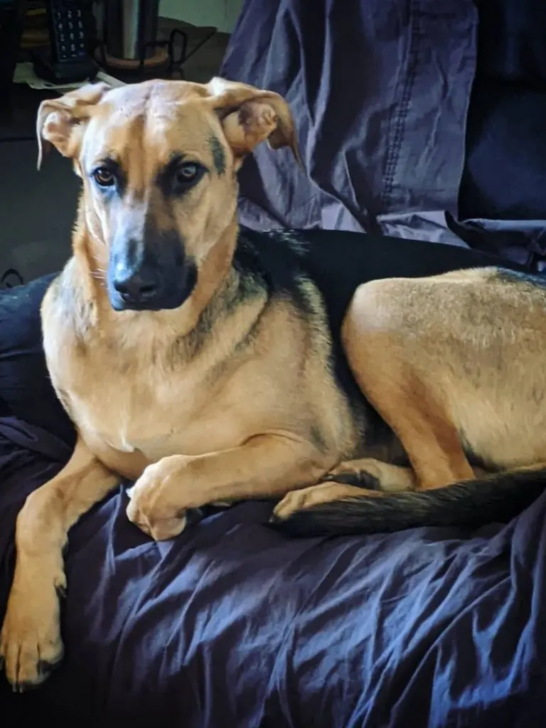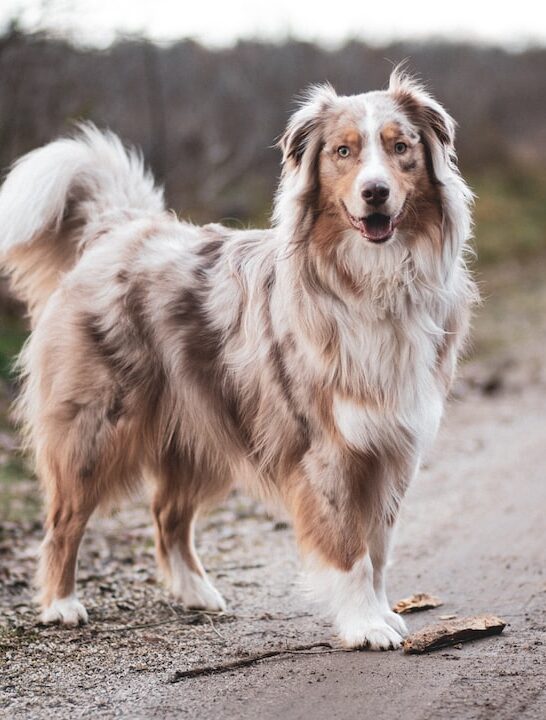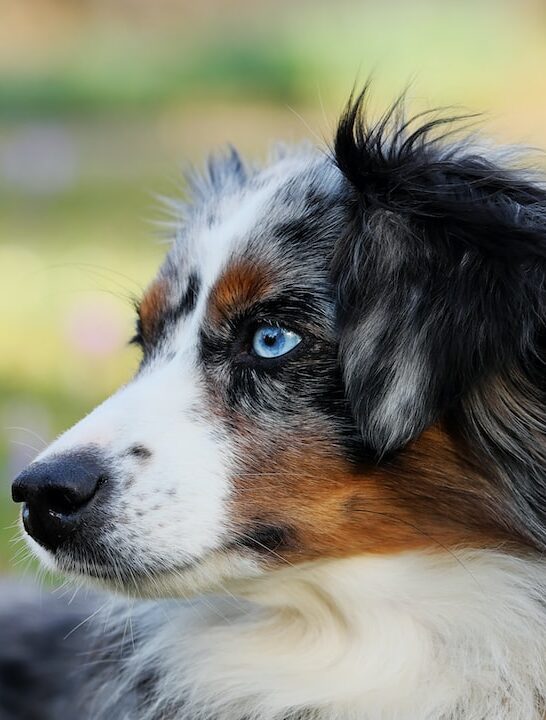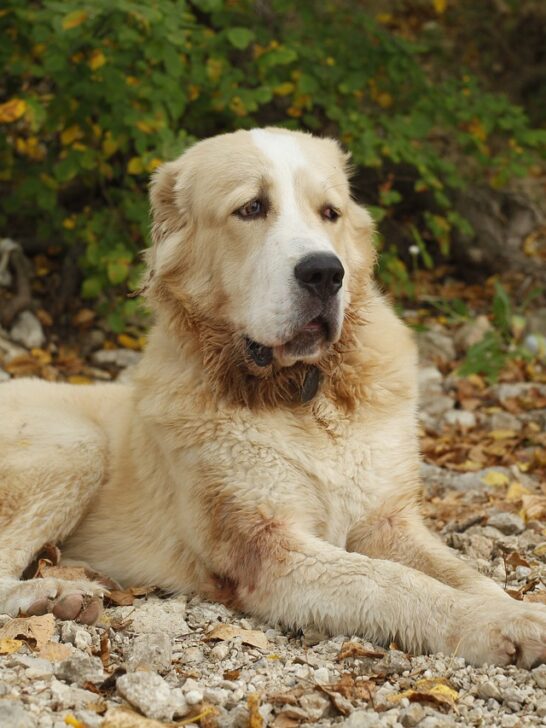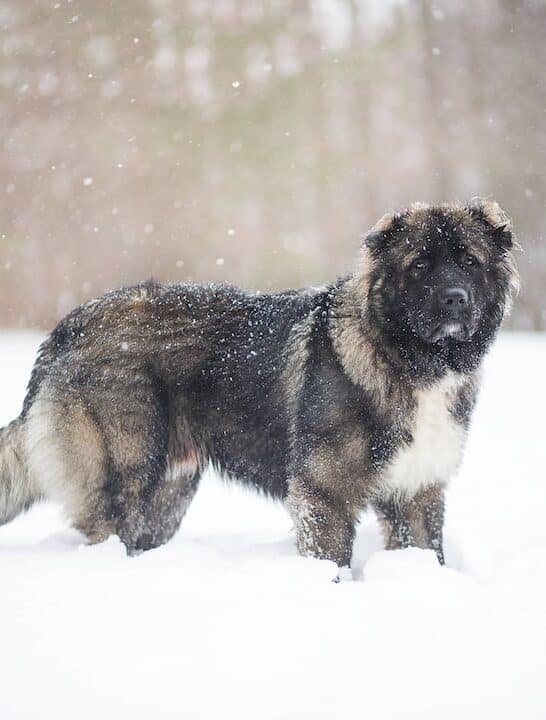King Shepherd: Meet the New King of the Shepherd Dog Breeds
King Shepherd is a relatively new dog breed, which is one reason why these dogs are not yet recognized by the American Kennel Club (AKC).
King Shepherd looks like a larger German Shepherd dog, which is exactly what this new breed of dog is designed to be.
According to the American King Shepherd Club, the King Shepherd breed got its start on the East Coast of the United States.
Today, there is a growing effort to promote King Shepherd as a new purebred dog breed separate and apart from the German Shepherd.
If you are curious about King Shepherd and want to learn more, this is definitely the article you need to read.
Watch a King Shepherd Dog Grow Up
In this short YouTube video, you can watch a tiny King Shepherd puppy grow up to become an enormous adult King Shepherd.
It can be hard to believe that such small fluffy puppies can grow into adult dogs that weigh over 100 pounds, but in this video, you can see it with your own eyes!
History of the King Shepherd
The German Shepherd consistently comes in as the second most popular purebred companion canine in the country according to the American Kennel Club (AKC).
Because the German Shepherd dog is so popular and has been bred so strictly to a certain Americanized breed standard for appearance, the gene pool for GSDs has become increasingly limited.
This has introduced some worrisome genetic health issues.
This isn’t just the case for the German Shepherd dog – in fact, many purebred dog breeds are facing similar health issues as appearance takes precedence over the fundamental health of the dogs themselves.
But for German Shepherds, the dog breed itself is so beloved that some breeders have taken direct action to try to stabilize their health, including trying to develop new dog breeds based on the German Shepherd that is healthier than the GSD.
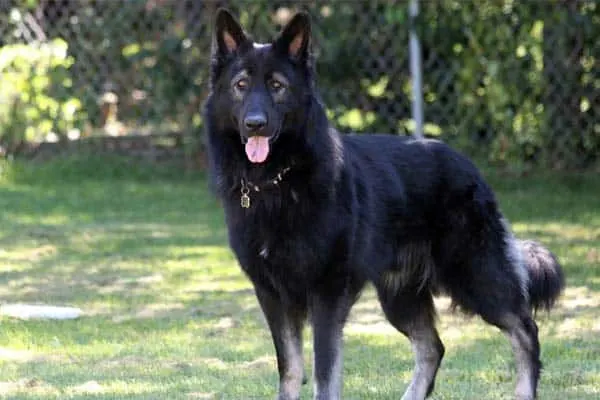
As the American King Shepherd Club explains, King Shepherd is one such breed.
The first breeders to undertake the develop a larger German Shepherd were Shelley Watts-Cross and David Turkheimer.
Watts-Cross and Turkheimer also founded the American King Shepherd Club.
This new breed got its start on the East Coast of the United States when breeders began to cross American and European German Shepherd dog lines to produce an all-purpose working dog breed from healthier foundation stock (breeding dogs).
Some breeders have also crossbred these new King Shepherds with another less-known still developing shepherd dog breed, the Shiloh Shepherd.
According to the Continental Kennel Club, other purebred dog breeds that may have influenced the breed line include the Alaskan Malamute and Great Pyrenees.
One of the biggest motivators that breeders have had for developing the King Shepherd breed is to preserve the finest qualities in the German Shepherd but try to eliminate many of the known genetic health issues that today’s GSDs can inherit.
Another goal is to develop a larger version of the German Shepherd, which is why breeders are now calling this new dog breed King Shepherd.
As the American King Shepherd Club explains, right now King Shepherd is considered a “rare” dog breed because the breed is still so new and is still in development.
The majority of today’s purebred dog breeds that are recognized and registered got their start in a similar manner, undergoing many generations of breeding before the breed was stabilized, a breed standard was outlined and the breed was recognized.
King Shepherd Size, Height and Weight
For comparison’s sake, the German Shepherd dog typically weighs between 50 and 90 pounds and stands 22 to 26 inches tall (paw pads to shoulder tops).
In contrast, King Shepherd typically weighs between 90 and 140 pounds and stands anywhere from 25 to 32 inches tall.
In both the GSD and King Shepherd, male adult dogs weigh 10 to 15 pounds more and stand two inches taller than female adult dogs.
As the King Shepherd breed standard currently outlines, these dogs are stocky but not bulky, with balanced bodies that are similar but simply larger than the German Shepherd.
King Shepherd Personality and Temperament
King Shepherd’s goal personality and temperament are self-confident, aloof with strangers, and very affectionate and loyal with their people.
While King Shepherd puppies may be friendly towards everyone they meet, as a puppy grows up and attains puberty, this is when training and socialization will help that dog become a calm and confident adult that can distinguish between friends and threats.
King Shepherd is a dog of moderate to high energy level (depending on age) with strong herding, guarding, and protection instincts.
Puppies and young adult dogs will be high energy while older adult and senior King Shepherds may have more moderate energy.
King Shepherd Socialization and Training Needs
Like all working K-9 dog breeds, King Shepherd needs early and ongoing socialization and training to learn how to temper their natural protective and herding instincts to live in a family and community.
King Shepherds that are properly trained and socialized will be great families watchdogs and protection dogs.
They are known to be tolerant of young kids – even those that are too young to understand how to play gently with a dog.
However, King Shepherds may not do so well if your family includes other small and vulnerable family pets such as small rodents or mammals.
These dogs have a very strong prey drive and chase instinct that could place these smaller pets in harm’s way.
Luckily, King Shepherd retains the German Shepherd dog’s high drive to please “their” people, which means these intelligent dogs are both quick to learn new commands and social skills but are also very eager to do so.
A King Shepherd puppy should start meeting other people and animals as soon as they have received all their shots and pest treatments and it is safe to leave the house.
This is the best way to teach a King Shepherd how to interact appropriately with strange people and animals, including visitors to the home.
King Shepherd Exercise and Activity Level
As we mentioned earlier in this article, King Shepherd puppies and young adult dogs will have a naturally high energy level.
As a King Shepherd dog gets older, their energy level will become more moderate.
However, even though these dogs are very energetic in their younger years, it is vitally important not to over-exercise a King Shepherd dog too early in life.
This is because, as with so many large and giant breed dogs, King Shepherd takes longer to finish growing up.
Because King Shepherd is considered a giant breed dog, this may mean restricting exercise until your dog is a year and a half old or older.
The reason being, too much vigorous exercise too early in life while the dog is still growing can cause damage to the dog’s joints and skeleton.
As Ready to Go Vet Rehab explains, larger breed dogs won’t be fully grown until the growth plates at the top of each long leg bone harden and close.
These growth plates are what tell a dog’s body to keep growing.
How fast they harden and close can depend on what a King Shepherd puppy is spayed or neutered, what the puppy eats, how much exercise they get, and also individual family genetics.
A veterinarian must take X-rays of the long leg bones to tell for sure if the growth plates have closed and hardened for good.
Once this has occurred, a King Shepherd can exercise and play without restriction.
King Shepherd puppies should be given training and free play sessions daily.
However, you shouldn’t take your puppy on long walks or even short jogs until the growth plates have closed.
As Animal Planet points out, a good general rule of thumb is to give your King Shepherd five minutes of additional exercise per day for every month of age.
So if your King Shepherd is four months old, this means your dog will need about 20 minutes of exercise per day. At five months, your dog will need 25 minutes of exercise daily.
At one year of age, your dog will need 60 minutes of exercise per day.
You can start walking your dog once your veterinarian has completed all required puppyhood immunizations, vaccinations, and pest control treatments.
Swimming is a good low impact exercise to tire a puppy out.
You can also add interactive puzzle toys, feeder toys, and snuffle mat sensory toys to tire your King Shepherd puppy out in mind as well as in the body.
Just like with your own fitness routine, it is important to build up exercise intensity slowly so your dog doesn’t end up getting injured or causing damage to the ligaments, muscles, tendons, tissues, and joints.
Then, once your King Shepherd dog is fully grown and X-rays have confirmed this, your dog will need at least two sessions of more vigorous exercise per day equaling up to two hours or 120 minutes.
You can break these up any way you like.
It is important to be aware that King Shepherd is not a dog that will acclimate well to the life of a couch potato pet.
If this dog doesn’t get enough exercise and activity every day, you may find that your dog becomes destructive.
King Shepherd Coat Care and Grooming
King Shepherd typically has a very similar medium-length coat to the German Shepherd dog.
As a working dog breed, King Shepherd has a thick, double-layer, working dog coat.
The under-layer of the coat is soft and thick and insulating to keep your dog warm and dry even while working out in inclement or very cold weather.
The outer layer of the coat is longer, thicker, coarser, with water repellant properties.
This layer is designed to help water slick right off your dog’s body and keep away pests, abrasions, sunburn, and other dangers.
The working dog coat will only work correctly if it is allowed to grow in and shed out seasonally as working dog coats are designed to do.
You don’t ever want to shave your King Shepherd’s coat! Once a working dog coat is shaved, it will not grow back in two separate layers the way it is supposed to do.
So your dog will lose most of the protection the coat is designed to offer.
Rather, you can control seasonal and year-round shedding and hair cleanup by doing a daily brushing with a de-shedding tool.
There are many great de-shedding rakes and brushes that can catch dead, shed hair, and keep your dog’s shedding under control.
Typically, King Shepherd will go through one or two heavier “coat blow” sheds each year and then will shed more lightly all year long.
This helps the coat replenish itself continually and also helps the dog adjust to seasonally changing temperatures.
Overall, King Shepherds tend to have fairly self-maintaining coats and don’t need to be bathed too often.
In fact, over-bathing your King Shepherd may strip the coat of beneficial oils that help maintain its water-resistant properties.
Your King Shepherd will need periodic nail trims and ear cleanings as well.
But the coat brushing is the main chore you will have to help your dog look and feel their best.
King Shepherd Health and Life Expectancy
King Shepherd typically has a life expectancy of between 10 and 11 years.
This is an improvement over the current American Kennel Club (AKC) German Shepherd dog life expectancy of just seven to 10 years.
However, because the German Shepherd dog has a great number of potentially concerning heritable (genetic) health issues, breeders that are developing the new King Shepherd breed line is still working hard to improve the overall breed health.
According to the Canine Health Information Center (CHIC) database, the German Shepherd dog has the following known heritable health issues:
- Hip dysplasia
- Elbow dysplasia
- Eye issues
- Autoimmune thyroiditis
- Cardiac issues
- Temperament issues
- Degenerative myelopathy
Both King Shepherd and the Shiloh Shepherd breed lines are working to identify the healthiest parent dogs that have been tested and cleared of all of the above heritable health issues.
In the case of King Shepherd, however, the fact that these are giant breed dogs is a compounding issue because over-exercise too young can also lead to joint problems.
Even if a King Shepherd does not inherit hip or elbow dysplasia, for example, the dog’s joints can still sustain an injury if a puppy is allowed to exercise too intensely before the growth plates have closed.
Even though King Shepherd is not listed in the CHIC database, nor is the Shiloh Shepherd, the German Shepherd’s genetic health data informs breeding efforts and should provide you with trustworthy information when choosing a King Shepherd breeder.
The breeder should be able to provide you with verification that the original parent dogs in the breed line have been tested and cleared of the above health issues before being bred.
You should also have your King Shepherd puppy examined by your own veterinarian within 24 to 48 hours after bringing your puppy home.
This can help identify any major health issues that are not detectable in other ways and save you a lot of heartaches.
Are King Shepherds Good with Kids and Families?
The King Shepherd dog breed is being developed to retain all of the finest and best qualities of the beloved German Shepherd dog without bringing along the concerning heritable health issues of that same breed.
German Shepherds are known to be wonderful, loyal, and protective family dogs that are affectionate and playful with their people.
King Shepherds should also exhibit these same qualities and traits, provided you give your puppy the right amount of early and ongoing socialization and training.
King Shepherds do not tend to bond more closely with one family member over the others, which also makes these dogs a potentially good choice for larger families.
The one concern to keep in mind is that since King Shepherd is a giant breed dog in adulthood, there is always a danger that the dog could cause harm to a very young child or baby just from sheer size.
No matter how calm and gentle the dog is, you should never leave babies or very young children alone and unsupervised with your King Shepherd.
Is the King Shepherd the Right Dog For You?
If you have enough time and energy to provide your dog with exercise, training, socialization, and interaction each day, then a King Shepherd can make a wonderful, loyal, and loving family pet.
These dogs want to be with their people doing whatever you are doing. If this sounds wonderful to you, then King Shepherd might be a great pet choice.
























